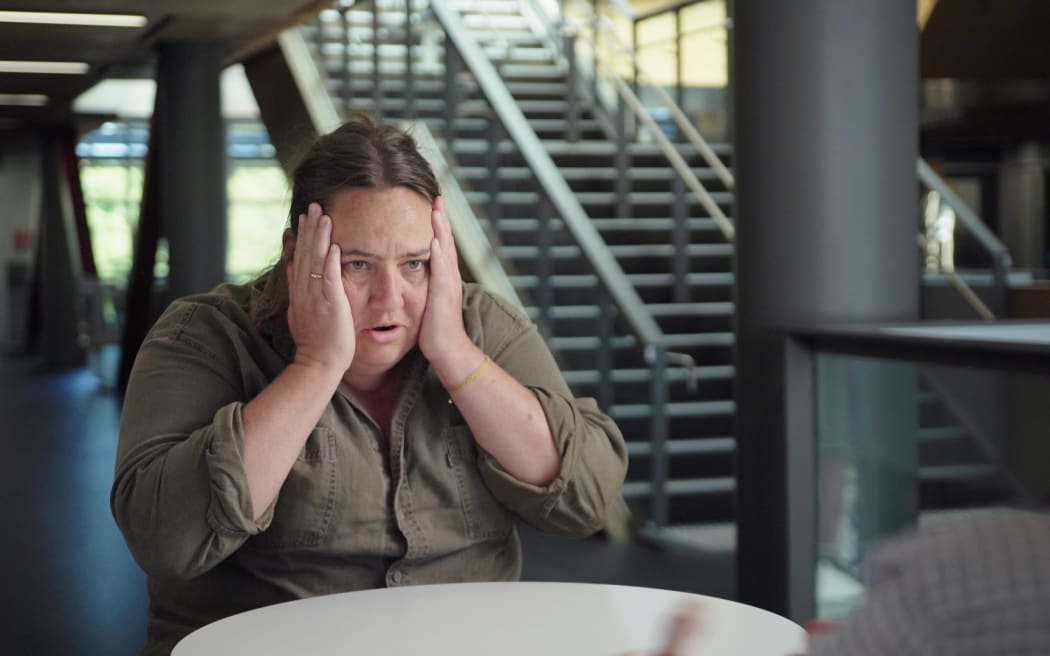Comedian Alice Snedden explores our curiously apathetic response to climate change in a new two-part instalment of the doco series Bad News.
"I knew [climate change] was a big issue and I knew it was a bad issue, and I just disengaged with it entirely. I felt like at large, that was also the response of society. It's almost too big to handle," she tells Jesse Mulligan.

Alice Snedden's Bad News Photo: Supplied
In Bad News, Green Party leader James Shaw theorises that our environmental apathy is in part due to having brains designed to deal only with danger that feels imminent – an idea that makes sense to Snedden.
"The danger is real but there's not an immediate consequence right in front of us, the consequences are going to be 50, 100 years from now. I think just intellectually that's quite hard to metabolise so we're able to kind of kick it down.
"I always liken it to smoking. I used to smoke. I loved it. And part of the reason that I think I could do it, knowing full well what it was going to do to me later, was that that didn't happen immediately from one puff. "
The latest Bad News episodes also feature conversations with climate change researcher Dave Frame, comedian Rose Matafeo and Federated Farmers boss Wayne Langford.
The national farming group is having a negative impact on this country, Snedden believes.
"I feel like that organisation is profiteering to our detriment and not just to society's detriment as a whole in New Zealand, but also the farmers who are working under that."
Despite this, she appreciates that Langford was up for answering her questions.
"It's harder and harder to get people on the show. So when anyone's prepared to front up to what they're actually doing, you know. I've got to give them props and merit for that but fundamentally, we disagree."
In her interviews, Snedden says she never tries to catch people out, and simply asks the questions she's genuinely interested in asking.
"Obviously, I have a point of view and the point of view is not objective, it's aligned with my own series of values. I'm not coming into these conversations neutral, just as a fact-finding mission, you know, I do have an agenda. But the agenda is not to make a fool of anyone or to catch anyone in anything. It's just in pursuit of what my values are, like justice and fairness."
Growing up, she says she was raised not to fear confrontation or hard questions.
"My childhood was littered with family group conferences around the dinner table to mediate whatever fight had been happening and to confront them head-on.
"I can remember even as like a young child arguing about the Springbok tour with my family who were all very anti-tour … I was 10. I was ferociously argued against by parents who had protested and siblings who knew better.
"I definitely grew up in a culture of don't be afraid to speak your mind, but be prepared for whatever's coming your way."
Since learning more about climate change, Snedden is much more aware of her own footprint, especially in relation to the food she chooses to buy.
Given that agriculture is responsible for 50% of New Zealand's carbon emissions, she says this seems to be the clearest way that New Zealanders can make a positive difference.
"It feels like that, as an individual, that's where I can have the biggest impact of thinking about how I'm consuming dairy, if I should be consuming it at all. That's a huge proportion of our emissions.
"If you are going to consume dairy, consciously consuming it, knowing how it's grown, what land it's being grown on, where the cows are being pasteurised on all that sort of stuff … just being aware of where your food comes from.
"It's become clear through doing this to me that the government's not going to do anything about this so really the only way to put pressure on these organisations is as a consumer. Using your consumer power I think is a possible way through this potential collapse of society."
Watch Bad News:

